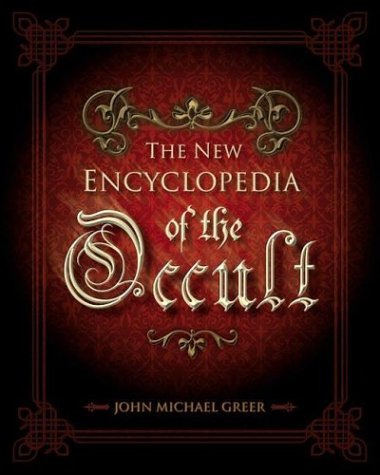John Michael Greer, The New Encyclopedia of the Occult
reviewed by Danielle L. Parker

The New Encyclopedia of the Occult Publisher: Llewellyn Publications, 2007 Length: 531 pages ISBN: 978-1-56718-336-8 |
I suspect when they told of the walls of Jericho and their famous collapse, they considered various scientific theories on how this might have happened, sans Godly intervention. If some Biblical place, person, or event didn’t have physical proof of existence, such should be, and often was, duly noted. I think they stopped short of calling all prophets delusional nuts, but I did suspect the thought was somewhere in the back of their minds. They were just too tactful to trot out the actual clinical diagnoses.
Needless to say, this high-minded skepticism was annoying. I did want to know historical and archeological findings of the modern day. But I didn’t really care for the approach that there must be a scientific explanation for every miracle (or merely a delusional nut somewhere). I suppose I was looking for an attitude between breathless wide-eyed literalism and Doubting Thomas prove-it-or-else.
Ah, but for a little of that wonderful scientific doubt in modern occult works! In the course of my research for my second novel, I picked up books that claimed, straight-faced, Tarot card divination harked back to the ancient Egyptians, in spite of the fact the first decks known date only to the 14th or 15th century. Just about every occult society that has ever existed has invented a mystical origin (Egyptian and Eastern being favorites, and of course, there’s always King Solomon). But a cursory check of their actual history reveals no more than the vivid imagination of their founding fathers.
And there just didn’t seem to be any work on the occult which combined a scholarly truthfulness with an open mind. That is, until I found Mr. Greer’s work, The New Encyclopedia of the Occult.
Unlike the collection of doctorate-decorated agnostics who wrote my Biblical encyclopedia, Mr. Greer is an actual practitioner in the Western occult tradition, so he doesn’t sneer at his subject. But he’s also that rarity in the occult world, a clear-eyed historian with a wry appreciation of the foibles of human nature.
I bought the book to research a few topics for my second novel, but I ended up reading it cover-to-cover. What a colorful history modern occult societies have! Few soap operas encompass the scope of their founders’ spite, power struggles and rivalries; no science fiction could match the depth of their invention. Greer’s work is far from an expose, but he doesn’t skimp on the colorful facts. Yet he writes with humor and sympathy. It’s a rare balance.
If you’re researching, or simply interested in, any topic related to Western mysticism, from Greek, Hebrew, Gnostic, pagan, Christian and Celtic to modern-day Scientology or dowsing, this is the book for you. Greer covers historical figures and occult societies, occult terms (quick: define cledonomancy for me), occult theories, Platonic theory... you name it.
And it’s just fun to read. Did you know the Elizabethan John Dee invented a language to summon angels? You can judge for yourself whether he ever succeeded, but his history is just one of the fascinating stories in this book.
Greer’s encyclopedia is, however, seriously short of depth in Eastern occult related topics. I hope he expands his encyclopedia to include more of the Eastern traditions in future releases.
But still, his current work remains an unsurpassed overview of the Western occult traditions and a fun read on its own. Go for it.
P. S. While we’re on the topic of the occult, another work I recommend is the multipart series The Occult History of the Third Reich. It’s a sobering look at the occult underpinnings of what may be the most successful black magic cult in history (available in DVD or as a book of the same title).
Then while you’re at it, throw in Paul Roland’s The Nazis and the Occult: The Dark Forces Unleashed by the Third Reich and (as a sobering companion book) Ladislas Fargo’s ground-breaking Aftermath: Martin Bormann and the Fourth Reich. The last is now difficult to find, but read it if you can get your hands on a copy.
Copyright © 2010 by Danielle L. Parker

